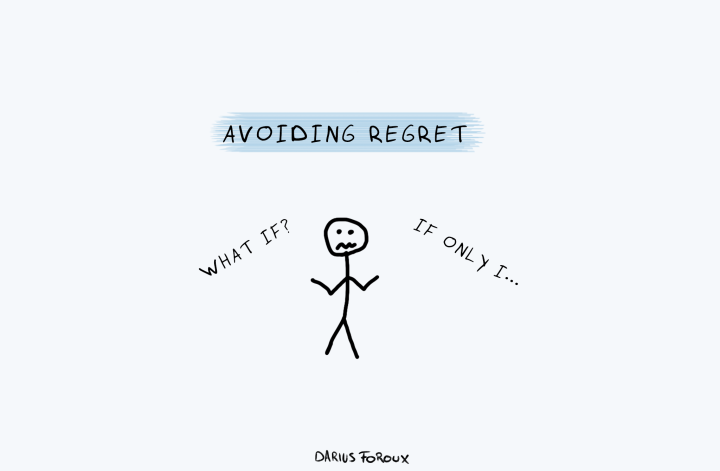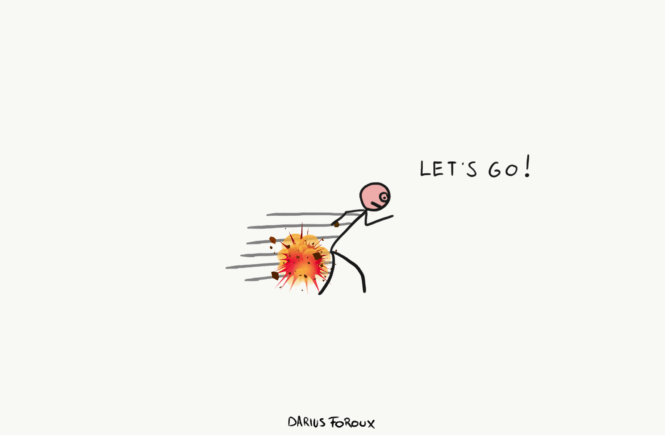One of my college professors once said, “I used to be a doctor” during a lecture about business strategy. I instantly put up my hand to ask him why he switched careers. I wondered whether procrastination was involved.
He laughed and said:
“I went to med school and worked as a GP for nearly 20 years. Then, I thought, I actually want to become an academic so I got my Ph.D. in business. And now I’m in my second chapter.”
I was intrigued and went to him after class. “May I ask how old you are?” I asked.
“I’m 61. And I got my Ph.D. when I was 55,” he replied. I was surprised and he could tell. I had never heard of someone who made such a big career switch at that age.
In my environment people gave up on learning and developing themselves in their 40s. So I asked, “How did you make that decision?” He answered:
“Life is long and you can do a lot of things. I let my curiosity drive me. For example, just the other week, I read about something fascinating. If you combine all the energy that the stars give off, it’s much more than the energy the sun gives. So why is it dark at night?”
“I have no clue,” I replied.
“You’re not alone. In fact, no one knows. It actually shouldn’t be dark at night. Isn’t that fascinating?”
I still use that example every time I talk about the mysteries of life and the limitations of human knowledge. There are many things we don’t know. I asked the professor about what it was like to go back to school in his 50s.
“I don’t regret it for a second. I knew it was something I wanted to do. I actually wanted to do it many years earlier. If I didn’t go for it, I knew I would regret it later in life.”
10 lessons that will help you to avoid regret
That story made a huge impact on me and I still think about it several times a year. I also want to be the person who makes such a big change in their 50s. It shows he wasn’t afraid and made no excuses. He took action.
We all know that putting off our dreams for one week turns into a month, then into a year, and then into decades, and finally, we die with regret.
If that sounds harsh, it’s because it is harsh. When you keep procrastinating you become one of those people who never do what they say.
Over the years, I’ve learned many lessons about how you can avoid that. Here are 10 important ones.
- Stay curious — Never stop getting excited about doing new things. If you let your curiosity drive you, you will never run out of motivation and inspiration.
- Learn every day — Your curiosity will lead you to new topics, challenges, goals, and desires. To achieve those things, we need to learn more. When you do that every day, you keep making progress.
- Aim for excellence — In everything you do, aim for doing it in the best way possible. Keep pushing yourself to do great work and to be great.
- Challenge yourself physically — Use it or lose it. That’s the harsh truth about our bodies. To keep using our bodies, we can’t just go to the gym three times a week and be happy. We need a challenge. Walk more, run faster, lift heavier, cycle farther. Just a little bit.
- Focus on yourself — Look, no one cares about what you do and what you’ve done. Stop trying to prove yourself. Don’t look for validation. Do things FOR YOURSELF. You’re the only one who really cares anyway.
- Limit entertainment — Consumption numbs your senses. You become a zombie who says, “Feed me! Feed me!” Create more instead of consuming more.
- Create value — Value is anything that’s helpful to others. I talked to a real estate developer last week and he said, “I’m in the business of creating shelter.” Now, that’s valuable. And so are many other things in the world.
- Set a good example — This is for all you leaders and inspirators out there. No one listens to you. People do what they want. However, they will follow your example (good or bad). So always be at your best.
- Avoid spending time with losers — The platitude is 100% true. You become who you spend the most time with. Spend time with losers, you become a loser. Spend time with people who do well in life, and you will do well too.
- Never give up — Don’t even think about it.
To never procrastinate, we need a different type of lifestyle. And it happens that one of the hardest things to accomplish in life is to change one’s lifestyle.
For several decades, scientists have been interested in ways people can change their lifestyles. Particularly in medicine, the stakes are high.
If a patient with diabetes or heart disease doesn’t change their lifestyle, it’s their life that’s on the line.
In a scientific paper by Mikael Jensen from the University of Gothenburg, he remarks that; “the concept of lifestyle is most often used without being defined as if it just means: way of living.”1Source: Deepdyve
In our world “way of living,” is deeply personal. No one likes to be told to live a certain way. My parent’s neighbor has diabetes and was recently told by her doctor in a last-ditch effort, “If you don’t change your diet, we have to amputate your foot.”
She was urged to change her lifestyle for decades, and now in her seventies, she finally buckled. “I finally laid off the candy,” she told my mother.
Consider what’s at stake when you procrastinate
In our lives, there are many equivalents to an amputated foot. I was talking to an acquaintance about investing the other day and he said, “I feel like I should’ve started way earlier. I’m 39 now and I can’t help but think it’s too late.”
That’s regret. Many of us don’t label it that way because it’s too painful.
But every time you say, “It’s too late,” it’s regret speaking. I hear it all the time. And it’s always been my biggest motivator.
I didn’t have to look far for that motivation. My family members always talked about the things they wanted to do, but for some reason, it was too late. Those reasons are nearly always excuses.
Why is it that the neighbor only changes their lifestyle when the doctor said, “We’re going to amputate your foot”?
It’s urgent. The consequence is vivid. That’s the strategy you must use for yourself.
I pictured myself broke, unhappy, out of shape, and aimless in life. It’s not a good feeling. Then, I started doing everything to avoid that fate.
Science has shown that humans are more driven by the fear of loss than the potential gain.2Source: JSTOR So use that science to your advantage. Look at what you will lose if you keep procrastinating.
Change your lifestyle for the better. That’s something I guarantee you will not regret.




